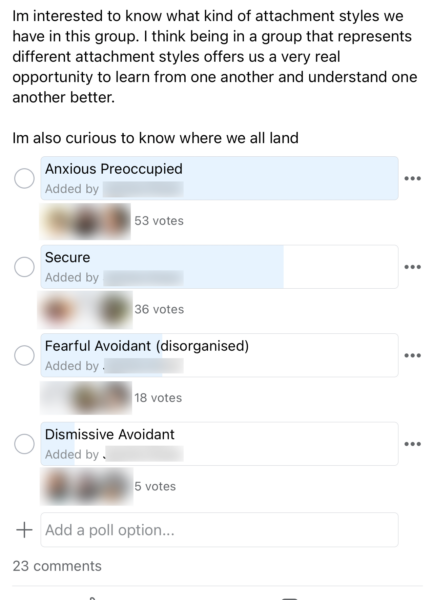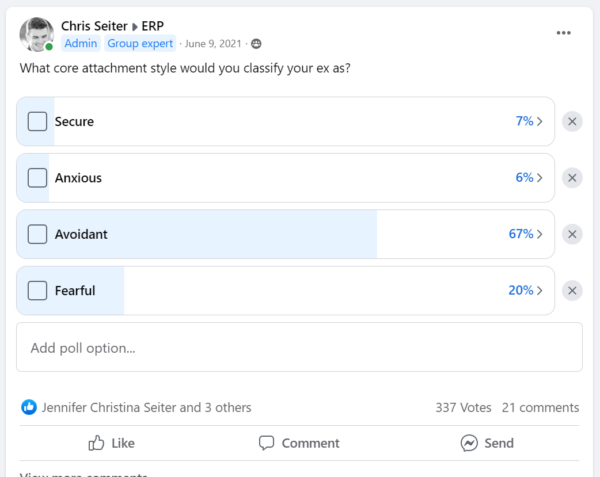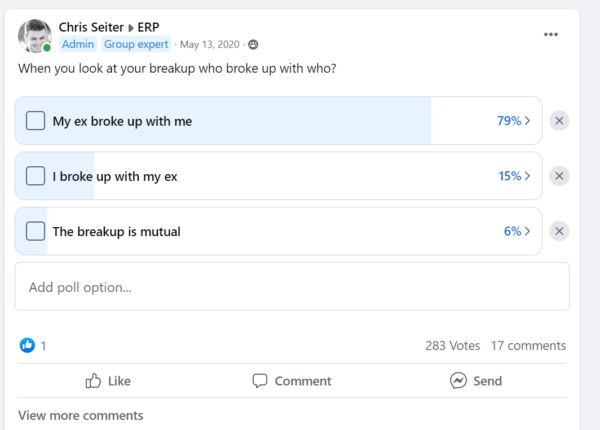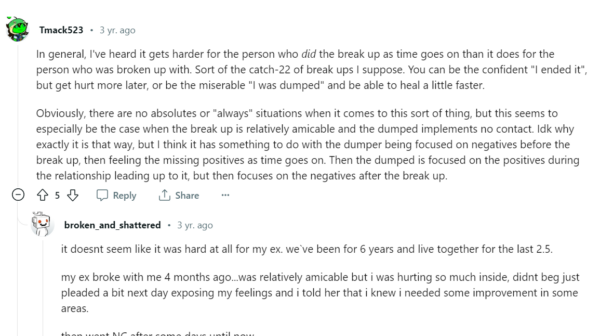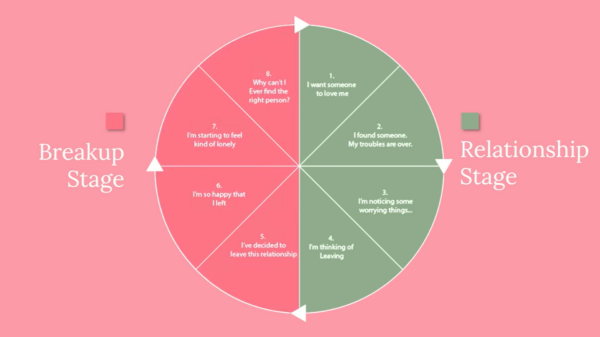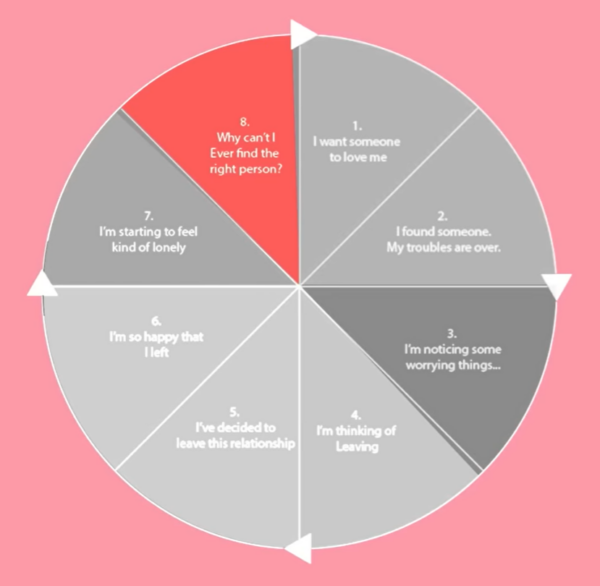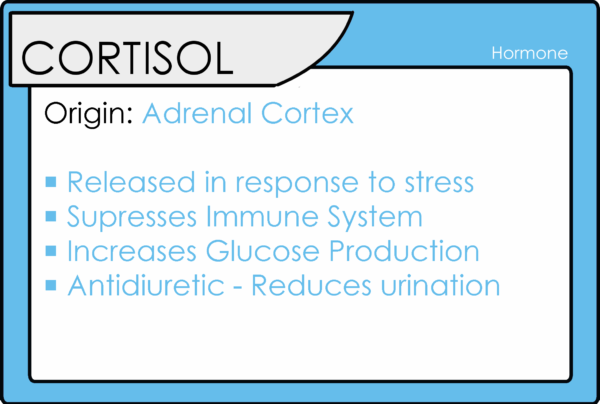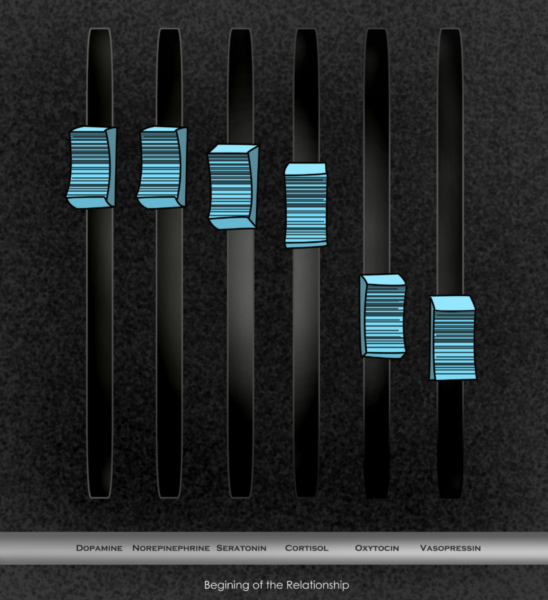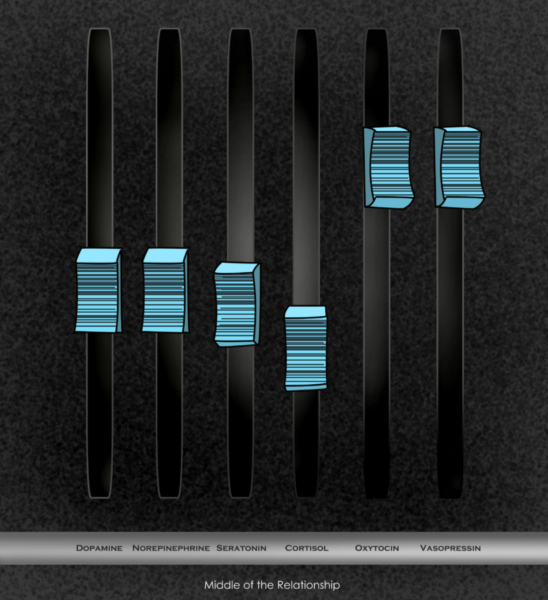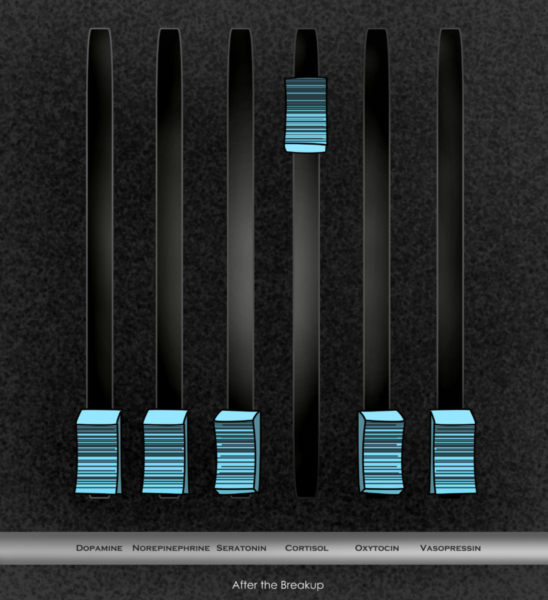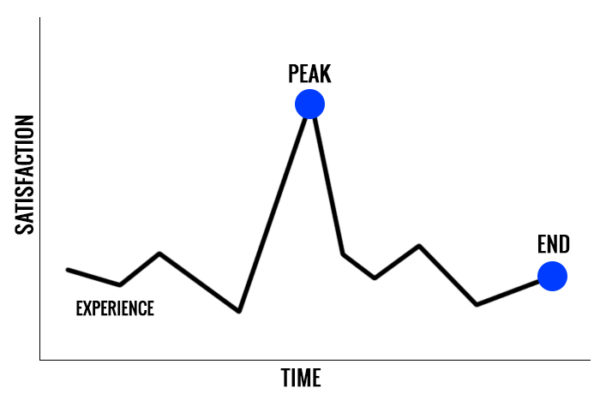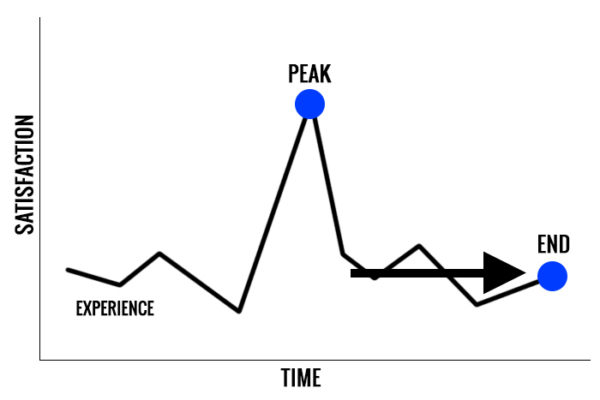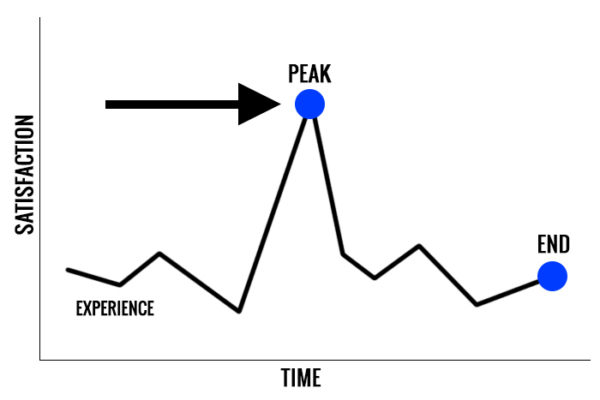I want to figure out exactly why it is that your breakup is getting harder as time goes on. So, for the past three hours I’ve tapped into my knowledge, psychology, neurochemistry and the U.S. Army of all places. Oh, and I even interviewed a psychologist.
All in all, here’s the core five reasons I came up with,
- You have different coping strategies based on attachment styles
- You are doing things to keep your cortisol in an elevated state
- You are codependent (no offense meant)
- You’ve started to idealize the past
- You have mismanaged expectations about how long it’ll take to get over the breakup
As always, let’s start from the top.

What Are Your Chances of Getting Your Ex Boyfriend Back?
Take the quizReason #1: You Have Different Coping Strategies Based On Attachment Styles
Over the years, I’ve conducted multiple polls, and the one I always return to is when we polled our community about their attachment styles.
The response from our community was they thought they were predominantly “anxious”.
Oh, but that wasn’t enough. I then decided to ask them what they thought about their ex’s attachment style, the result was “avoidant”.
These are important data points because there’s a disconnect between how these two particular attachment styles handle a breakup.
Someone with an anxious attachment style will often attempt to mend things after a breakup.
They’ll blame themselves; their reactions are inward-facing, and quite often, they resort to “gnatting”.
GNATTING is essentially our generic term for excessive texting. It’s also a fitting description of how their ex might perceive them – like a gnat that won’t go away.
G- Going
N- Nuts
A- At
T- Texting
Conversely, an avoidant will navigate a breakup by relishing their newfound freedom.
For those with an avoidant attachment style, their fundamental wound centers on the need for independence.
Often, they are the initiators of breakups, and when they go through one, they delight in regaining their autonomy.
Avoidant individuals tend to prefer solitude, and they experience a kind of “separation elation” upon ending a relationship.
So, on one side, you have the anxious individual constantly ruminating over the breakup, and on the other, you have someone reveling in their freedom. The avoidant feels uplifted while the anxious individual feels devastated. This disparity intensifies the pain for someone with an anxious attachment style, especially when they see their avoidant ex seemingly flourishing without them.
The pressing question many ponder is: does this dynamic last indefinitely?

What Are Your Chances of Getting Your Ex Boyfriend Back?
Take the quizWill This Dynamic Last Forever?
Before writing any article, I conduct thorough research, delving into psychological papers, consulting psychologists, and sometimes perusing forums like Reddit.
While gathering information for this piece, I found a compelling comment on a Reddit forum.
The user was inquiring why their breakup pain intensified over time.
They mentioned,
“In general, I’ve heard it gets harder for the person who initiated the breakup as time progresses, more so than for the person who was broken up with. It’s a catch-22 of breakups. You can feel assured thinking ‘I ended it’ but suffer more later, or endure the initial pain of being dumped and recover a bit quicker.”
This sentiment encapsulates what I term the “avoidant death wheel”.
The avoidant death wheel is a graphic I devised to depict the post-breakup journey of an avoidant individual.
While it has eight distinct stages, it’s the seventh and eighth that stand out.
This phase transitions from the euphoria of separation to a deeper processing of the breakup’s emotional toll.
The challenge is that many anxious individuals, whether seeking reconciliation or not, reach out to their avoidant ex during their “separation elation” phase.
Consequently, the timing is mismatched. The avoidant isn’t receptive to reconciliation or even communication, which can prolong the healing or sometimes sidestep it altogether.
Reason #2: You Are Keeping Your Cortisol At An Elevated Level
One of the graphics on this website that I consistently reference when explaining the science of breakups demonstrates the role cortisol plays in the aftermath of a relationship.
Cortisol is a neurochemical associated with stress.
Whenever you find yourself in a stressful situation, your cortisol levels rise. And, I don’t know about you, but breakups are, for many, among the most stressful experiences imaginable.
Here’s a breakdown: this is what the neurochemical balance in a relationship looks like at the beginning of a relationship,
This is the mid-point,
And this represents the end,

What Are Your Chances of Getting Your Ex Boyfriend Back?
Take the quizLook at how cortisol just shot WAAAY up.
But there’s an intriguing facet to cortisol.
It’s a natural neurochemical.
Typically, when you experience heightened cortisol levels, they return to baseline within two to three hours. However, if you consistently maintain a heightened state of anxiety and stress, cortisol acclimates to this elevated state, and then it might take up to six months for levels to normalize.
A breakup undoubtedly spikes your cortisol.
But what sustains its elevation?
Your coping strategies during the breakup.
If you continually monitor your ex, attempt reconciliation, or incessantly check their social media profiles, these actions serve as subtle reminders that sustain elevated cortisol levels. The longer cortisol remains elevated, the longer it’ll take to return to baseline.
Thus, it can be argued that as long as your cortisol is elevated, you’re still grappling with the breakup.
This is why I emphasize the importance of moving on and outgrowing your ex, even if reconciliation is desired. It’s a “two birds, one stone” scenario. Moving on not only assists in reducing cortisol but can also enhance your attractiveness, especially to an avoidant ex.
Hence, it’s not far-fetched to suggest that the persistent difficulty of a breakup might be attributed to ongoing behaviors that sustain elevated cortisol levels.
Reason #3: You Are Codependent
This assertion might rub some people the wrong way.
Perhaps my perspective is slightly biased given that we encounter many anxious individuals in our coaching practice, many of whom exhibit behaviors characteristic of codependency.
But here’s an interesting observation: it’s challenging to pinpoint precisely what proportion of the population is codependent.
I came across several studies and statements, surprisingly from the US Army, reinforcing this notion.
They mentioned that the prevalence of codependency is tough to determine. Some estimates suggest that over 90% of the American population shows codependent behavior. Conversely, a study by Crestor and Lombardo found that nearly half of the surveyed college students exhibited moderate to high codependent traits.
So, what can we deduce from this?
It’s evident that there isn’t a consensus regarding the percentage of individuals who are codependent.
However, there’s some level of agreement suggesting that the figure is likely higher than most would anticipate.
One study indicates 90%, while another suggests around 50%.
Relying solely on two studies won’t provide a comprehensive answer, especially when discussing a multifaceted concept like codependency. Yet, I’d argue that the prevalence of codependency within relationships is higher than most would expect.
To underscore this point, I interviewed a registered clinical counselor from Vancouver, Julia Kristina.
She offered a compelling perspective on codependency, defining it as an over-reliance on someone else for one’s identity and sense of self, holding the belief that another person can complete us. Contrary to the sentiment expressed in “Jerry Maguire,” this notion isn’t accurate.
The crux of my emphasis on codependency is its significant impact on post-breakup emotions and perceptions. When you’re codependent with your ex, you’re more likely to idealize the past, among other consequences.

What Are Your Chances of Getting Your Ex Boyfriend Back?
Take the quizReason #4: You Are Idealizing The Past
Have you ever come across the peak-end rule?
This rule essentially describes the way humans remember experiences.
Contrary to popular belief, we don’t capture every moment of a memory because our brains don’t have the capacity to store all those details. Instead, the brain subconsciously decides which memories to retain and which to let go of. Intriguingly, when it comes to relationships, and particularly in the context of codependency, there’s a marked tendency to idealize the past.
This brings in the concept of recency bias.
The peak-end rule posits that our recall of experiences is based on two specific points: peak moments and the end.
Therefore, when reminiscing about a relationship, people don’t necessarily reflect on every painful moment.
Instead, they often recall the best moments or, conversely, the moments of hurt, particularly those near the end of the relationship. What’s captivating is that codependent individuals often shift their focus over time, gradually forgetting the ending of the relationship and predominantly recalling the peaks.
At the onset of a breakup, recency bias kicks in, making individuals dwell primarily on the negative emotions they felt.
This often hinders the healthy process of moving on from an ex. And even if the goal is to reconcile, moving on should be the initial step. Instead, many fall into the trap of ruminating on what they’ve lost and feel an urge to mend things. If things don’t improve, over time, their focus shifts from the pain they felt to romanticizing the past, especially the peak positive moments.
This pattern deepens their emotional turmoil, pushing them to strive harder to recapture those bygone days of happiness. Consequently, as time progresses, one reason breakups may feel increasingly difficult is this tendency to idealize the high points, while overlooking the challenges that spanned the relationship.
Reason #5: Mismanaged Expectations
Determining an exact timeframe for getting over a breakup is a contentious issue.
In fact, during my research, I found that opinions vary widely.
I wrote an article delving deep into this subject, drawing from a myriad of resources.
The results?
No consensus.
- A 2007 study proposed a recovery time of three months
- While a 2017 survey indicated 18 months.
- A TED talk suggested around 11 months.
- Our internal research within our coaching practice pointed to five to seven months.
- Separate cortisol studies hinted at a period of six months.
- Even AI provided diverse answers, ranging from 18 months to three years.
The crux is that there’s no unanimous agreement.
But this divergence makes sense because post-breakup experiences are inherently individualistic. However, patterns do emerge. What I’d like to do is assist you in managing your expectations.
Often, individuals misjudge the duration of the post-breakup recovery process, whether it’s getting over their ex or trying to reconcile. Many assume that either process is swift, but that’s rarely the case.
To simplify, let’s classify breakups into three categories:
- Big breakups: You were in a relationship for three to 10 years.
- Middle breakups: The relationship spanned between nine months and two years.
- Small breakups: The relationship lasted less than nine months.
As a general guideline:
- For big breakups, anticipate a recovery time of six to 12 months.
- Middle breakups might require three to six months.
- Small breakups usually need about one to three months for healing.
It’s crucial to understand these are just benchmarks and not definitive timelines.
They’re meant to offer a realistic expectation of the recovery process.
If you find the post-breakup period increasingly difficult, perhaps it’s because your initial expectation was a three-month healing phase.
But if you’re coming out of a big breakup, the realistic recovery might range from six to 12 months.
